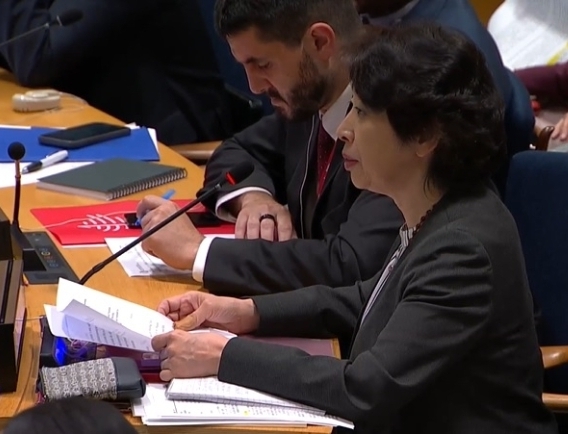文民保護(紛争下の行方不明者)に関する安保理アリア・フォーミュラ会合における志野大使ステートメント
令和6年6月12日

(As delivered)
Madam Chair,
I thank Switzerland and the Global Alliance for the Missing for hosting this Arria Formula meeting. I would also like to thank Ambassador Albanai, Dr. Forero Martinez, Mr. Bhandari, and Ms. Anselmo for their briefings with personal stories. Also, I am moved to hear colleagues making strong statements with concrete and personal anecdotes. It shows the importance of addressing this agenda.
This month marks the fifth anniversary since Resolution 2474 was adopted. Yet, the situation of missing persons in armed conflict continues to be grim. As previous speakers repeatedly mentioned, it is shocking to them that in 2023, the International Committee of the Red Cross (ICRC) registered more than 40,000 new missing person cases, the highest ever number of annual registrations.
For civilians, being embroiled in armed conflict itself is distressing enough. Additionally, not knowing the whereabouts or fate of loved ones—be it a mother, father, son, daughter, sister, or brother, or friends—multiplies their suffering. When armed conflicts are prolonged, such anguish persists for many years. The international community must prevent such tragedies, and in this regard, I would like to stress three points.
First, all parties to the conflict must respect international law, including international humanitarian law and take all possible measures to prevent enforced disappearances, and to find those missing. Japan also pays tribute to international organizations, including the ICRC and the International Commission on Missing Persons (ICMP), for their relentless pursuit of investigations. We should acknowledge that many have been able to reunite with their families thanks to those efforts too.
Second, the international community must support family members of missing persons. All states and relevant parties must acknowledge the long-term impact on mental health and psychosocial consequences on families of missing persons and must provide relevant support to them.
Third, it is imperative to improve the use of data and technology to find those missing. The different databases maintained by various organizations, including NGOs, may impede investigative efforts. Given that the newly established Independent Institution on Missing Persons in the Syrian Arab Republic is expected to consolidate databases of information related to missing Syrians from various organizations, Japan hopes that they will establish good practices in utilizing data effectively.
Madam Chair,
Finding missing persons and supporting family members is profoundly a humanitarian issue. Japan stands in solidarity with missing people in armed conflicts and their family members who endure immense hardship.
Thank you.
I thank Switzerland and the Global Alliance for the Missing for hosting this Arria Formula meeting. I would also like to thank Ambassador Albanai, Dr. Forero Martinez, Mr. Bhandari, and Ms. Anselmo for their briefings with personal stories. Also, I am moved to hear colleagues making strong statements with concrete and personal anecdotes. It shows the importance of addressing this agenda.
This month marks the fifth anniversary since Resolution 2474 was adopted. Yet, the situation of missing persons in armed conflict continues to be grim. As previous speakers repeatedly mentioned, it is shocking to them that in 2023, the International Committee of the Red Cross (ICRC) registered more than 40,000 new missing person cases, the highest ever number of annual registrations.
For civilians, being embroiled in armed conflict itself is distressing enough. Additionally, not knowing the whereabouts or fate of loved ones—be it a mother, father, son, daughter, sister, or brother, or friends—multiplies their suffering. When armed conflicts are prolonged, such anguish persists for many years. The international community must prevent such tragedies, and in this regard, I would like to stress three points.
First, all parties to the conflict must respect international law, including international humanitarian law and take all possible measures to prevent enforced disappearances, and to find those missing. Japan also pays tribute to international organizations, including the ICRC and the International Commission on Missing Persons (ICMP), for their relentless pursuit of investigations. We should acknowledge that many have been able to reunite with their families thanks to those efforts too.
Second, the international community must support family members of missing persons. All states and relevant parties must acknowledge the long-term impact on mental health and psychosocial consequences on families of missing persons and must provide relevant support to them.
Third, it is imperative to improve the use of data and technology to find those missing. The different databases maintained by various organizations, including NGOs, may impede investigative efforts. Given that the newly established Independent Institution on Missing Persons in the Syrian Arab Republic is expected to consolidate databases of information related to missing Syrians from various organizations, Japan hopes that they will establish good practices in utilizing data effectively.
Madam Chair,
Finding missing persons and supporting family members is profoundly a humanitarian issue. Japan stands in solidarity with missing people in armed conflicts and their family members who endure immense hardship.
Thank you.
